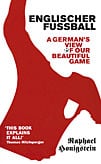 A German’s view of our beautiful game
A German’s view of our beautiful game
by Raphael Honigstein
Yellow Jersey, £11.99
Reviewed by Mike Ticher
From WSC 274 December 2009
Psychoanalysing national character is “a murky business”, says Raphael Honigstein, a German journalist who has lived in England since 1993. It certainly is, especially when your picture of the nation is a caricature. An unflattering view from an outsider is often unsettling. It can also be refreshing and challenging, but only if the insights are original. Honigstein has absorbed a lot about English football through direct experience and its literature (he leans heavily on David Winner and David Downing), but most of his conclusions seem to me exaggerated, too broad or half-truths, at best.
This book was first published in German three years ago and is clearly intended for German readers. Probably most of them are less irritated than I was by careless factual errors, not all of which have been rectified in this updated translation (Sheffield United were not the first football club in the world, Alan Hudson did not play for Southampton, “long-haired Catholic knights” were not the main supporters of Charles I, etc).
More problematic than facts are Honigstein’s interpretations. He swallows whole some of the most worn-out cliches of English football history. In this rendering Alf Ramsey is the monochrome villain of the 1960s and 70s, with a familiar cast of mavericks (Hudson, Frank Worthington, Peter Osgood, Charlie George et al) as the betrayed heroes. He implies Ramsey was to blame for Jimmy Greaves becoming an alcoholic, when he “could have been one of the greatest goalscorers of all time, an English Gerd Müller”. Curious, since Greaves was indeed one of the greatest goalscorers of all time, while Müller’s scoring feats and medals did nothing to prevent his own drinking problems. The role of alcohol is only one instance where Honigstein seems to overplay or oversimplify the differences between England and other countries – especially Germany.
Although he admits to finding English football “damned attractive”, he paints it in a harsh light. It is hypocritical, corrupt, backward, ignorant, obsessed with war, full of sexual ambiguity and repression (the pleasure fans take in games where their team “comes from behind” is apparently loaded with symbolism) and, above all, uniquely violent.
There is truth in some of this of course. But Honigstein’s generalisations are so gross and his rhetoric so extreme that tendencies are turned into pathologies and unrelated events into conspiracies. He refers to the “voyeuristic delight in seeing iron studs tear into opponents’ calves” (since when were studs made of iron?). In the 1980s, we learn, “almost every game” led to riots. Small wonder that his conclusions are suspect. What value can we put on his statement that England’s poor results are always blamed on “a lack of fighting spirit”, when in fact blame falls almost invariably on a lack of technique and tactical sophistication?
Honigstein has much more thought-provoking (rather than just provoking) things to say when he switches the focus of comparisons to Germany. The differences in media practices are fascinating, particularly the revelation that Jens Lehmann rewrites not merely his quotes before publication – routine in Germany – but his commas. He also effectively lays bare the lopsided nature of England’s rivalry with Germany and the reasons for German indifference to it.
Sadly, much more space is taken up with analysis of such dubious commentators as Desmond Morris, Paolo Hewitt and John King. The German edition was subtitled “the secret history of English football”. But history that makes surprising claims isn’t necessarily secret – sometimes it’s just wrong.